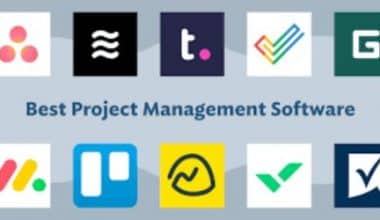Budgeting is essential to business success, so the tech world has released many financial tools. With so many options, every company can find the right budgeting tool. We’ve compiled a list of the best project budget management tools, personal budgeting tools, and free online budget planners.
Best project budget management tools, personal budgeting tools, and a free online budget planner help businesses streamline and organize their budgets. Next-generation tools are “intuitive” and require less training, so they’re easy to use and can be implemented quickly. Online software providers release updates every two months to keep software current.
If you want to move your budgets out of Excel or add structure, check out this list of alternatives. We’ll start with the most popular and best project budget management tools and move to a smaller niche to help you find the right tool to manage, plan, and forecast your company’s budgets.
Project Budget Management Tools
Project budget management tools keep finances in check. These tools help you manage and monitor project spending. Popular project budget management tools are easy to use. You get multiple budget features. You can categorize spending, monitor financial summaries, receive regular notifications, and share the budget.
These tools manage your budget precisely. We’ll show you the best project budget management tools.
#1. Scoro
Scoro combines budgeting and other tools for company management. You can manage expenses, resources, and project budgets.
Highlights:
- Budget projections
- Analysis and reports
- Budget-free projects
- Dashboard KPIs
- Professional services invoicing automation
- Automatic invoice revenue
Scoro combines budgeting, CRM, and project management tools so you can manage your entire business in one place.
- Pricing: From $26 per user/month, 14-day free trial.
#2. Centage
Centage is a comprehensive enterprise budgeting software provider that offers tools called Maestros for budgeting, forecasting, financial reporting, etc. Furthermore, Centage is a comprehensive solution.
Highlights:
- Budgeting & Planning
- Forecasts
- Dashboard, Reporting
- Analytics-rich
Centage integrates with widely used enterprise management software like SAGE, Dynamics, and QuickBooks.
- Pricing: upon request
#3. Prophix
Prophix has created software for corporate performance management, which includes tools for managing a company’s resources and budgets.
Highlights:
- Forecasting, budgeting, and planning
- Statutory and management reporting
- Budgeting
- Optimization of profits
- Staffing
Prophix offers a tool that scales as a company grows.
- Pricing: upon request
#4. Float
Float integrates seamlessly with Xero, Quickbooks Online, and Free Agent.
Highlights:
- Forecasting cash flow
- Budgeting
- Infographics
Float is a visual, easy-to-use tool that clarifies your company’s budget and cash flow.
- Pricing: Small (1 user account) $35/month, Medium (3 user accounts) $59/month, large (10 user accounts) $119/month
#5. Mint
Mint is another proposed budget management tool with advanced features. The tool’s ability to set budget limits is great. These limits aren’t always enforced. You can set your own limits. Mint’s clean interface makes it easy to use.
Highlights:
- Shows all your accounts
- Cash, cards, and investments on one platform
- Get bill and subscription cost reminders.
- Set goals to control spending.
- Transactions categorized
- Pricing: The app is available for free.
#6. YNAB (You Need a Budget)
YNAB (You need a budget) is our pick because you need a budget for your project. Furthermore, YNAB offers to track and monitoring features to keep your project budget in check. Its customizability makes it popular. You can customize the tool for any industry or project.
YNAB’s price is justified. New budgeters save $600 in their first two months and $6,000 in their first year.
Highlights:
- Link accounts and transactions to the app.
- Sync your devices automatically
- Strong goal-setting features
- Always track progress
- Use the Loan-calculator to borrow more.
- Pricing: Monthly Plan – $14.99 per month; Annual Plan – $98.99 per year
#7. Planguru
Planguru is a simpler budgeting software than Centage and Prophix and may be what you need for your small budget.
Highlights:
- Integrated financial statement template
- Utility Payroll
- Accountants’ Engagement Tools
- 20+ Predictive Methods
- Non-financial data forecasting
Planguru’s analytics tool helps get a financial overview and make better decisions.
- Pricing: $99/company/month + $29 for each additional user
#8. GIDE
GIDE combines budgeting, strategic planning, and rolling forecasts in one corporate performance management platform.
Highlights:
- Profit/Loss, Balance Sheet, and Cash Flow
- Asset management
- Finance
- Data operations
- Capitalization
GIDE promises a two-week implementation process, compared to 8 weeks for budgeting software.
- Pricing: N/A
#7. Maxiplan
Organizations can plan and track financial performance more effectively with Maxiplan’s cost-effective budgeting solutions.
Highlights:
- Performance management
- Budgeting/forecasting
- Profit-loss and cash-flow projections
- Actual/budget/plan variances
- Analyzing revenue forecasts
- Ad-hoc consolidation and planning
Maxiplan helps companies struggling with Excel spreadsheets organize their business.
- Pricing: N/A
#8. Tagetik
Tagetik is a simple business budgeting software that improves budgeting and forecasting.
Highlights:
- Management
- Budget projections
- Reporting/analytics
- Financial consolidation
Tagetik promises Excel ease, cloud flexibility, and financial intelligence.
- Pricing: N/A
Personal Budgeting Tools
Here is a list of the best personal budgeting tools:
#1. Honeydue
We chose Honeydue as one of the best personal budgeting tools for couples because it helps you manage money with a partner. You can link accounts, customize what information you share, and discuss money through the app. Notifications alert you to upcoming bills or when you or your partner exceed pre-set budget categories.
Pros
- Free monthly
- Choose how much account info to share
- Automatically classify transactions
- Overspending alerts and bill reminders
Cons
- iOS, Android only (no desktop app)
- Financial illiteracy
- Few reporting features allow for big-picture views.
Honeydue focuses on joint communication to help couples manage finances. Honeydue makes sharing financial information easier by letting you respond to your partner’s transactions with emojis. You can aggregate linked account information to see all individual and joint transactions.
#2. PocketGuard
We chose PocketGuard as one of the best personal budgeting tools for college students because it lets them see at a glance how much money they have to spend. Its goal-tracking features an intuitive pie chart that helps even new budgeters. Its free features are great for students.
Pros
- All features are free
- In My Pocket shows available cash instantly.
- Smart algorithms save money.
Cons
- The free version limits categories and goals
- The paid app has ads.
- Limited reporting options
PocketGuard’s simple interface and pie charts make budgeting and spending tracking easy for college students. In My Pocket reduces overdraft risk by always showing available spending money.
#3. EveryDollar
We chose EveryDollar as one of the best personal budgeting tools for families because you can create a budget in less than 10 minutes. It allocates every dollar but makes the process easier for families. It syncs across devices so everyone can see spending.
Pros
- Created by personal finance expert Dave Ramsey
- Offers a 14-day free trial
- Real-time device synchronization
Cons
- The free version requires manual transactions.
- The annual fee is $130.
- Manually classify transactions
EveryDollar is ideal for families who want to budget together without paying a monthly fee. It lets you allocate every dollar you spend and provides a customizable template for budgeting.
#4. Albert
Albert is one of the best personal budgeting tools for saving money because it simplifies and automates budgeting. The tool monitors spending identifies spare cash and transfers it to a digital wallet. You can withdraw your savings at any time and earn annual cash bonuses with your Albert debit card.
Pros
- Smart Savings helps you save money easily.
- Automatically earn 0.10% on savings or up to 0.25% with Genius.
- Invest from app
Cons
- No download
- Phone support unavailable
- Few budgeting resources
Albert creates an automatic budget to track your spending. Instantly see your income, bills, and leftover cash. You can also view past budgets or transactions as a pie chart.
Online Budget Planner
It’s the online budget planner that started a revolution. Link your savings, checking, and credit card accounts. Your accounts update automatically. Spending is often automatically categorized. Here is the list of budget management tools for online budget planners.
#1. BudgetPulse
If you’re wary of online apps accessing your accounts, try BudgetPulse.
You don’t share usernames and passwords and can track spending and set goals. Charts and graphs show your money. You can also share your financial goals with family and friends. The social aspect can keep you accountable and allow your family to contribute via PayPal or Amazon Payments.
#2. Buxfer
Buxfer helps you track spending and bills. This online budget planner is for 20-somethings who want to start out right. You can project income and savings interest to plan your finances. Work toward short- and long-term goals.
Additionally, Buxfer helps you manage group expenses. You can split bills, figure out who owes what and pay online to settle IOUs.
#3. MoneyStrands
MoneyStrands connect your financial threads. This software imports banking and credit information. Use this software to track your 12-month spending plan.
View upcoming bills and financial projections. MoneyStrands can be used in multiple languages and multiple currencies, which is useful for frequent travelers or those with foreign income.
#4. Moneytrackin’
Once you know where your money goes, you can spot leaks and change your habits. Moneytrackin’ shows where the money goes. It tracks, divides, and creates shared budgets. Moneytrackin’ has small-business accounting tools. This software helps home businesses track income and expenses. It’s a great tool for managing finances.
#5. My Spending Plan
My Spending Plan helps you live within your means. Quickly plan your long-term and short-term goals, special events, and more. This budget software uses envelopes. My Spending Plan sends emails, alerts, and bill reminders. Personalize your settings to see your big picture. My Spending Plan has coupons and promotions to help you save money and stick to your budget.
#6. BudgetSimple
BudgetSimple is simple and straightforward. An online budget planner helps you get out of debt. You track expenses, manage bills, and learn to budget. BudgetSimple is a no-frills way to create a budget. Charts and other visuals show your progress.
#7. SavvyMoney
SavvyMoney can help with debt payoff and saving. First, assess your situation. After assessing your situation, you create a debt repayment plan. SavvyMoney helps you track your progress. You can get pay-down tips.
What tools do you use to manage your budget?
Free budget management tools are recommended. Mint.com: The popular personal finance site Mint tracks cash flow and budgeting. The site will help you analyze your finances and offer savings tips.
What are 5 budgeting methods?
Here are five professional budgeting methods.
- 50/30/20 Budget
- 70/20/10 Budget
- Zero-based budget
- Cash envelope budget
- Pay-yourself-first budget
What are the 4 methods of budgeting?
These four types of budgeting methods are the most common: incremental, activity-based, value-based, and zero-based.
What is the easiest budgeting tool?
Best free budgeting tools:
- Google Sheets: Best free spreadsheet
- Mint: the best free smartphone app
- Goodbudget: best free app for beginners.
- Personal Capital: best free investor app
- GnuCash: Best free desktop software for small businesses
What is the best budgeting system?
Mint. Like EveryDollar and YNAB, Mint is more robust budgeting software that makes budgeting easier and helps you stay on top of bills by setting alerts. Mint lets you drag bank transactions into budget categories.
What is the best budget plan?
Try a simple budgeting plan. We recommend the popular 50/30/20 budget to maximize your money. 50% of your after-tax dollars go to necessities, 30% to wants, and 20% to savings and debt repayment.
Conclusion
Using free project budget management tools can reduce stress and give you more freedom. We’ve listed the best project budget management, personal budgeting, and free online budget planners. Sign up for your preferred tool and start crunching numbers.
Budget Management Tools FAQs
What are the 7 types of budgeting?
The 7 different types of budgeting are strategic plan budget, cash budget, master budget, labor budget, capital budget, financial budget, and operating budget.
What are budgeting strategies?
A budget strategy is a formal way to manage funds. Many people use budgets to keep their spending under control.
What is budget planning?
Budgetary planning involves creating a budget to control a business’s operations. Budgetary planning reduces the risk of worse-than-expected financial results. The first step is to create a budget.
{
“@context”: “https://schema.org”,
“@type”: “FAQPage”,
“mainEntity”: [
{
“@type”: “Question”,
“name”: “What are the 7 types of budgeting?”,
“acceptedAnswer”: {
“@type”: “Answer”,
“text”: “
The 7 different types of budgeting are strategic plan budget, cash budget, master budget, labor budget, capital budget, financial budget, and operating budget.
“
}
}
, {
“@type”: “Question”,
“name”: “What are budgeting strategies?”,
“acceptedAnswer”: {
“@type”: “Answer”,
“text”: “
A budget strategy is a formal way to manage funds. Many people use budgets to keep their spending under control.
“
}
}
, {
“@type”: “Question”,
“name”: “What is budget planning?”,
“acceptedAnswer”: {
“@type”: “Answer”,
“text”: “
Budgetary planning involves creating a budget to control a business’s operations. Budgetary planning reduces the risk of worse-than-expected financial results. The first step is to create a budget.
“
}
}
]
}
References
Related Articles
- Wealth Management Best Practices: Top 5 Tips From Leading Wealth Managers
- HOW TO MAKE MONEY WORK FOR YOU: Easy Ways to Make Your Money Work for You
- FINANCIAL GOALS 2022: The Complete Guide for Students and Businesses (+ quick tips)
- 7 Practical Budgeting Tips to Save Money
- Capital Budgeting Decision Techniques and Analysis
- How To Budget While in School






